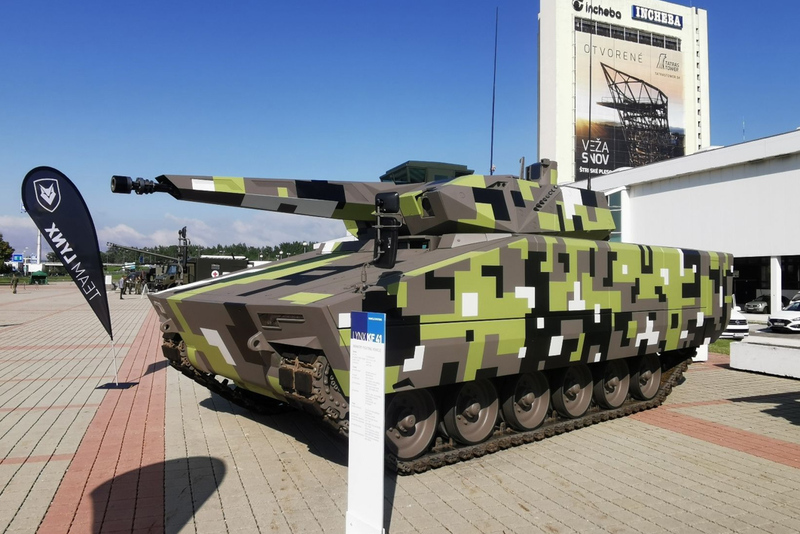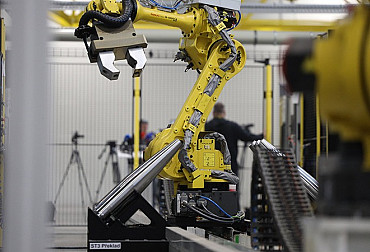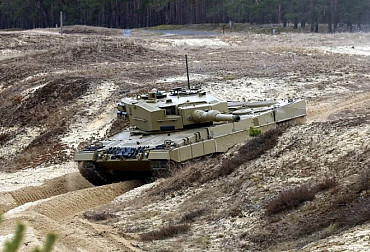Purchase of new tracked Infantry Fighting Vehicles for the Slovak Armed Forces - Rheinmetall builds a partner network in Slovakia
This year, the Slovak Ministry of Defence has presented bold plans to modernise the equipment of the Ground Forces of the Armed Forces of the Slovak Republic (AF SR). It plans to purchase 228 tracked Infantry Fighting Vehicles (IFVs) and up to 500 Armoured Fighting Vehicles (AAVs) in 20 different versions over the next few years. The purchases of both types of ground equipment are to take place in several stages. In the first phase of the acquisition, 152 tracked IFVs and 76 8x8 AAVs are to be purchased. One of the candidates in the tender for the new tracked IFVs is the German Lynx vehicle from Rheinmetall.
The Slovak Land Forces, like many former Eastern Bloc states, currently have mainly tracked BVP-1, BVP-2 and a modernised version of the BVP-M. Since taking office in 2020, the current defence minister Jaroslav Nad has spoken about the need to modernise the Slovak Land Forces, which the previous leadership of the Slovak Ministry of Defence was unable to implement transparently, and has stressed the need to meet Slovakia's commitments to its NATO allies. In order for Slovakia to fulfil its commitments, it is necessary to build a heavy mechanised brigade with modern equipment. This is also why the Ministry of Defence is currently preparing the purchase of new tracked infantry fighting vehicles. The acquisition is to be carried out on a government-to-government basis and by the end of October the Slovak Ministry of Defence had received a total of eight offers.
 Picture: One of the candidates in the tender for the new tracked BVP for the Slovak Land Forces is the German vehicle Lynx (pictured) from Rheinmetall | Martin Šiška / CZ Defence
Picture: One of the candidates in the tender for the new tracked BVP for the Slovak Land Forces is the German vehicle Lynx (pictured) from Rheinmetall | Martin Šiška / CZ Defence
The acquisition of new tracked Armoured Personnel Carriers is mentioned in several planning and strategic documents of the Slovak Ministry of Defence. For example, the Final Report of the 2020 Defence Spending Review recalls that the General Staff, based on the 2017 Capability Objectives, states the need for tracked IFVs for the Heavy Mechanised Brigade, in the number of 164 vehicles. The 2030 Long Term Plan speaks of upgrading or replacing only 105 IFVs. Plans for the acquisition of new tracked chassis IFVs are also discussed in the Methodology for Determining Investment Priorities, which places the replacement of tracked armoured vehicles among the priority tasks of the Ministry of Defence and the Slovak Armed Forces in the area of building and maintaining capabilities for the period 2022-2027. A similar document lists 2023 as the start of deliveries of new tracked IFVs. For the project itself, the MoD also published a project plan and feasibility study this year. The feasibility study envisages a price tag of €1.739 billion for the purchase of 152 tracked IFVs in the first phase of the project. In the first phase, 131 tracked vehicles are to be purchased in the IFV version, then 15 vehicles in the commander version, 3 recovery vehicles and 3 technical assistance workshop vehicles.
Lynx as a possible favourite
During this year, the management of the Ministry of Defence of the Slovak Republic was supposed to get acquainted with three tracked IFVs from leading European manufacturers of ground equipment. These were specifically the CV90 from BAE Systems, the ASCOD from GDELS and the Lynx from Rheinmetall. It should be mentioned that all three companies offered the same vehicles to the Czech Army. However, the project of acquiring new IFV has been stopped in the Czech Republic and the next course of action is up to the new management of the Ministry of Defence.
Returning to the project of acquisition of new tracked vehicles for the Slovak Armed Forces, the public could notice that Rheinmetall, offering Lynx IFV, is trying to establish cooperation with Slovak companies and has already found several partners. In August this year, Ray Service announced that it would produce electrical components for Rheinmetall at its plant in Žilina. Specifically, the company will manufacture and supply cables and wiring harnesses for the Lynx KF41 IFV, which Hungary has ordered 218 units of.
Another Slovak company with which Rheinmetall is cooperating is CSM Industry Tisovec. In this case, it is not a new cooperation, but rather an extension of an existing cooperation. With CSM Industry Tisovec, Rheinmetall already cooperates on the development and assembly of universal finishing machines for Western markets. At this year's IDEB defence technology fair in Bratislava, where the Lynx tracked Infantry Fighting Vehicle was also on display, the two companies signed a memorandum of understanding and cooperation regarding the Lynx KF41 vehicles. CSM Industry Tisovec will produce the main components and parts for them based on the signed memorandum.
In October this year, Rheinmetall extended its partnership with another Slovak manufacturer, namely Neways from Nova Dubnica. The two companies have had a strong business relationship for several years, but the latest collaboration involves the manufacture of Controlled Area Network (CAN Bus) electrical equipment for military vehicles. These devices are to be manufactured in Slovakia and, according to Rheinmetall's vice president of sales Oliver Mittelsdorf, the systems from Neways will be used in several types of vehicles such as Boxer, Fuchs, as well as Lynx.
As Rheinmetall is trying to establish its Lynx vehicle in different parts of the world (besides Hungary and the Czech Republic, also in Australia or the USA, for example), this may give Slovak companies the opportunity to get into Rheinmetall's global supply chain and thus establish new partnerships with companies already involved in this supply chain. Although the final decision of the Slovak Ministry of Defence is a long time away, Lynx may be in the shortlist thanks to Rheinmetall's activity in Slovakia.





















